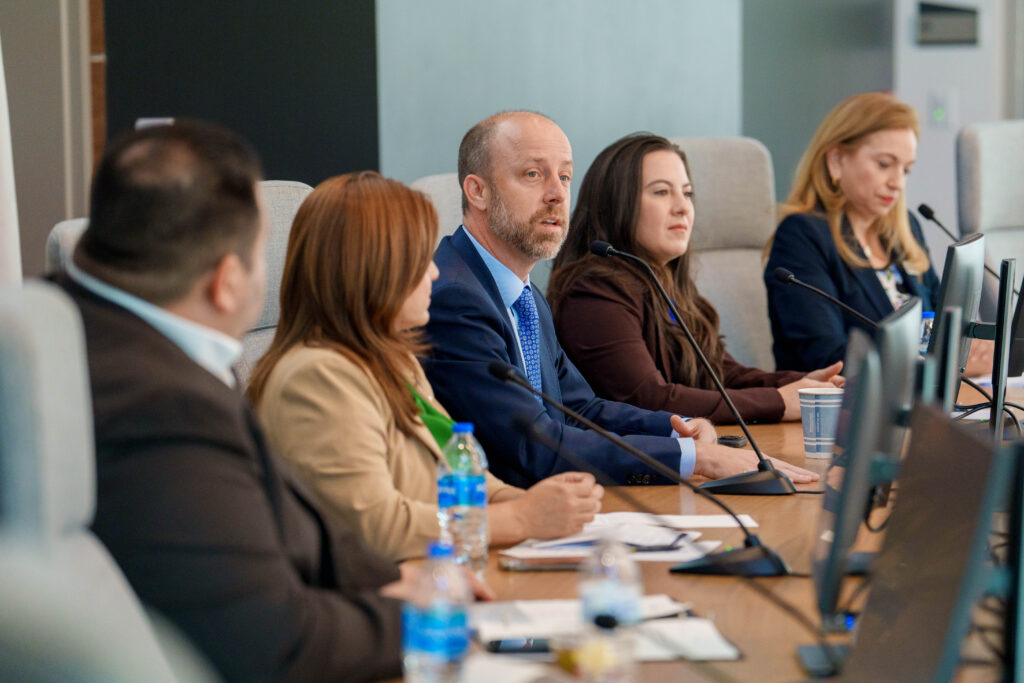Press Releases
BPUB Hosts Information Session About Drought
 The Brownsville Public Utilities Board (BPUB) hosted an information session on July 11 to address the ongoing drought affecting the Rio Grande Valley. Key stakeholders, including state Reps. Janie Lopez and Erin Gámez, Brownsville Mayor John Cowen Jr., Port of Brownsville Chair Esteban Guerra, and BPUB General Manager and CEO Marilyn D. Gilbert, gathered with community stakeholders and business leaders to discuss Brownsville’s water resources, current drought conditions, and future strategies to create a more sustainable water supply.
The Brownsville Public Utilities Board (BPUB) hosted an information session on July 11 to address the ongoing drought affecting the Rio Grande Valley. Key stakeholders, including state Reps. Janie Lopez and Erin Gámez, Brownsville Mayor John Cowen Jr., Port of Brownsville Chair Esteban Guerra, and BPUB General Manager and CEO Marilyn D. Gilbert, gathered with community stakeholders and business leaders to discuss Brownsville’s water resources, current drought conditions, and future strategies to create a more sustainable water supply.
Key Discussions and Topics
BPUB Water Resources Overview: BPUB provided an overview of its water sources, highlighting that 28% of its water is sourced from groundwater treated at the Southmost Regional Water Authority (SRWA) plant, while the remaining 72% comes from the Rio Grande. This dual-source approach ensures a more resilient and reliable water supply for the community. BPUB aims to optimize and expand the SRWA plant to achieve a 10-million-gallon per day (MGD) capacity initially, with plans to eventually expand to 20 MGD. Provided funding for these projects can be secured, the optimization phase is expected to be completed as early as 2027, and the expansion phase by 2030.
1944 Water Treaty: The session also addressed water management between the United States and Mexico. The 1944 Water Treaty, which governs water distribution from the Rio Grande, was highlighted. Under the 1944 treaty, Mexico must deliver 1.75 million acre-feet of water to the United States every five years, a commitment currently challenged by severe drought conditions in Mexico. As of June 29, 2024, Mexico has delivered 391,241 acre-feet of water (at year 4 of the 5-year cycle). BPUB is actively engaged in discussions to find resolutions. Communications have been coordinated with the Lower Rio Grande Valley Development Council, the International Boundary and Water Commission (IBWC), and the U.S. Department of State.
Current Drought Conditions: Brownsville is experiencing Stage 2 drought conditions. As of June 29, the combined ownership at Amistad and Falcon reservoirs stood at 19%. The outlook for Stage 3 was also addressed. BPUB staff emphasized that Stage 3 could be triggered if the reservoir levels drop to 15%, a decision that would ultimately be made jointly by the Brownsville mayor and BPUB’s general manager. The presenter stressed the importance of ongoing conservation efforts and raising community awareness.
Updates to the Water Contingency Plan: BPUB and the city of Brownsville are updating their Water Contingency Plan, shifting from a compliance-driven approach to an enhanced water strategy plan. They have engaged a leading engineering firm to assist in developing this plan to align with U.S. Bureau of Reclamation grant requirements as well as the State of Texas statutory requirements. The plan will utilize the best available science and industry practices to produce effective strategies for drought response, including:
- Vulnerability assessment and mitigation approaches
- Conservation strategies and specific targets
- Leak detection and response
- Drought stage criteria, measurement, and response planning
- Recommended drought restrictions
Resaca Restoration Program: The BPUB Resaca Restoration Program, launched in early 2013, aims to restore Brownsville’s vital resaca systems. This program improves water circulation and helps mitigate flood conditions. By removing sediment, the program increases storage capacity for stormwater runoff and enhances BPUB’s raw water storage capacity.
Advanced Metering Infrastructure (AMI): BPUB is investing $29.7 million to install and utilize AMI on over 100,000 electric and water meters. Water meter installation is anticipated to begin in the Spring of 2025 and is expected to be complete by Spring 2027. The AMI project supports water conservation efforts through:
- Improved leak detection and isolation
- Malfunctioning meter detection
- Providing consumption data for customer behavior programs
- Better rate design to encourage and reward water conservation
Robindale Wastewater Treatment Plant Effluent Diversion: The Robindale Wastewater Treatment Plant currently discharges 8 MGD of treated wastewater, which flows via a channel to the Gulf of Mexico via San Martin Lake. BPUB is analyzing the opportunity to divert this water to Resaca De La Guerra as a raw water supply. Water Treatment Plant 2 can source water from Resaca De La Guerra and treat it to potable water standards. An engineering firm has been retained to assist with planning, permitting, and grant applications for the U.S. Bureau of Reclamation (USBR) Drought Response Program.
Water Conservation Programs & Awareness: BPUB actively promotes water conservation through various programs. The Toilet Rebate Summer Promotion, which offers a rebate of up to $100 for purchasing and installing a high-efficiency toilet, encourages the use of high-efficiency toilets, which can save up to 30% of an average home’s indoor water consumption, reducing water and wastewater costs. Additionally, BPUB is developing a Water Eco-Kit that includes items to assist customers with water conservation and leak detection around the home. Rebates for high-efficiency washers, irrigation systems, rainwater collection, and xeriscaping are also under consideration. BPUB is enhancing its website with drought-related content, actively posting on social media, and producing educational videos. Traditional media channels are being utilized by engaging with local media, placing drought-related advertising, and broadcasting messages on the radio. Furthermore, BPUB is engaging the community and internal stakeholders with targeted outreach campaigns.
Challenges and Community Efforts
Population Growth: Panelists discussed the challenges posed by Brownsville’s growing population and the increased demand for water.
Carwash Ordinance: Mayor Cowen highlighted the Brownsville city ordinance restricting new car washes within a 5-mile radius of each other and requiring new car washes to use recycled water, further reducing water consumption.
Acknowledgments
BPUB extends its gratitude to the panelists for their participation:
- State Reps. Janie Lopez and Erin E. Gámez
- Brownsville Mayor John F. Cowen Jr.
- Port of Brownsville Chair Esteban Guerra
- BPUB General Manager and CEO Marilyn D. Gilbert
BPUB also thanks all attendees, including community stakeholders and business leaders, for their participation and commitment to securing the region’s water future.
BPUB remains dedicated to implementing innovative solutions and engaging the community in conservation efforts to ensure a sustainable water supply for Brownsville.
Reference: The presentation provided at this information session can be found here.
